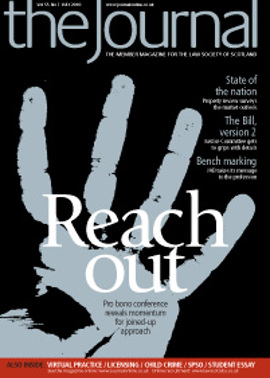Taking shape

A busy summer of talks is in prospect, and much could yet happen at stage 3 of the parliamentary process.
But the likely final shape of the Legal Services (Scotland) Bill is now considerably clearer following the stage 2 sittings of the Justice Committee.
Many, though by no means all, of the changes supported by the Society and the profession have been accepted; a number of others are to be discussed with ministers in what committee convener Bill Aitken predicted would be a “fairly lengthy and convoluted” summer conversation.
Investors allowed
Turning first to what has been the most divisive issue from the profession’s point of view, as things now stand external investment in and ownership of legal practices is to be permitted, subject to majority control remaining with solicitors, alone or together with “members of other regulated professions” – the 51%-49% split narrowly approved at the Society’s recent AGM.
No provision exactly enshrining the “Dailly amendment”, limiting non-lawyer ownership to 25% and confining it to individuals working within the practice, was moved, but a Labour-backed proposal for up to 25% external ownership was lost on the basis that it was neither enough to satisfy ABS supporters nor suitable for small firms. Labour member James Kelly however indicated that he might seek to raise the subject again at stage 3.
The formula now approved is not set in stone. Under a further Government amendment, ministers can by regulation amend the specified percentages, or indeed repeal the entire majority ownership section – though only if they believe that such action would be compatible with the regulatory objectives in s 1, and “appropriate in any other relevant respect”. They will also first have to consult the Lord President, the Society, every approved regulator, the Office of Fair Trading and such other persons as they consider appropriate.
Then there have been changes to the “fitness to own” test. On the one hand, minority shareholders (with a stake less than 10%) can be exempted from satisfying a regulator’s full fitness-to-own tests. On the other, there has been added a provision that family, business or other associations, so far as bearing on character, are relevant in considering fitness to have an interest, which Michael Clancy, the Society’s Head of Law Reform, believes will enable account to be taken of potential alliances of sub-10% holders. In addition, a non-solicitor investor can now be disqualified for behaviour incompatible with the regulatory objectives or the professional principles, or improper interference in the provision of legal services by the business.
Independence again
Professional independence has been at the heart of the debate over alternative business structures, and the Society had pledged to seek particular amendments to underpin the safeguards in the bill. Did it achieve these? The Society’s principal aim, Clancy says, was to ensure that the Lord President was inserted as a “constitutional buffer” – a term used in the debate – between ministers and approved regulators, his consent now being essential to the approval by ministers of an approved regulator.
This role now appears in several places in the bill, including the provisions relating to confirmation agents, and making regulations in relation to the key positions of head of practice and head of legal services in a licensed provider, and, says Clancy, comprises “a very significant bulwark against ministerial interference in approved regulators or in approving bodies”.
The Government has also accepted some restrictions in its rule making powers, which are expressed more narrowly and are also subject to additional requirements as respects consultation. The Society had proposed a number of specific amendments regarding consultation, but there is now an overarching requirement in a new section that ministers, where they consider it appropriate, must consult persons or bodies that appear to have significant interest in the particular subject matter.
Much heat was also generated on the independence front by the original s 92 of the bill, which would have conferred a reserve power on ministers to specify a minimum proportion of lay members to be appointed to the Society’s Council, and also criteria that some or all of them should fulfil.
At the ABS roadshow in Edinburgh in March, the minister, Fergus Ewing, announced that he now considered this power unnecessary, and it has been removed from the bill. But to ensure that the new committee (half solicitor, half lay) which is to carry out the Society’s regulatory functions, can operate properly, it can include people who would be suitable for appointment to Council but have not been so appointed; and its independence from Council has also been strengthened by enabling it to appoint subcommittees without reference to Council.
The Justice Committee voted down a further Labour proposal that the Society be required to set up a separate representative council to carry out representation functions.
Extending regulation
Moving on to matters on which the profession presented a more united front, a whole new chapter has been added to the bill to bring in a system of regulation covering non-lawyer will writers. The scheme, the first of its kind in the UK, is similar to the provisions already proposed for confirmation agents.
At the first stage 2 sitting there was also an attempt by Labour members to bring in regulatory provisions covering employment law services provided by non-lawyers. The move failed, the Government opposing it on the ground that it had not been consulted on and there was a lack of evidence of a problem in this area, but cross-party interest was expressed in a suggestion that reserve powers might be added to permit the Government to add by delegated legislation to the types of business requiring to be regulated. There is as yet no word of any such provisions being put forward at stage 3.
Ultimate protection
Considerable time has been spent on the Guarantee Fund and how to provide equivalent protection for clients of ABS-type firms. MSPs were in no doubt that such protection should be enacted, but no satisfactory way has been found, so the minister told the committee, of setting up a separate scheme for such concerns. Hence, although the Society had held out against the possibility of claims on the present fund arising from the activities of businesses it did not regulate, as the bill stands the same fund will be available to clients of solicitors’ firms and other legal services providers alike, whether or not the latter are regulated by the Society.
This may, of course, be less significant as long as the 49% limitation on external ownership remains in place. The minister also made the point in debate that as it tends to be the smaller practices that give rise to claims, we may well find that ABS firms end up being net contributors to the fund. Only time will tell.
The Society has succeeded in having individual claims on the fund capped at £1.25 million, though has yet to achieve its further goal of a global annual cap on claims. That too could be part of the summer conversation, though committee members were concerned that any such ceiling might work in an arbitrary fashion. A suggestion that the Society might have some oversight role even for practices otherwise regulated elsewhere, may also be explored further.
As an aside regarding who regulates whom, no one has seen fit to address what some within the profession have perceived to be an anomaly, that whereas firms not owned solely by solicitors can apply to be regulated by the Society, there is no corresponding provision to enable a traditional solicitors’ firm to elect to come under the supervision of another approved regulator. Presumably this reflects the thinking, expressed by the minister in other contexts, that those who wish to carry on practice as they have done to date, should be affected as little as possible by the bill.
Further modifications
Who should actually be permitted to call themselves solicitors was also given some attention by the committee. Section 90 has been amended to provide that the Society shall make rules under which it would be able to give written authority to a licensed practice for the use of the term “solicitor”, or any name, title, addition or description which includes the word, such as “Solicitors and Accountants”.
One concession made by the Government was to allow people employed by “citizens’ advice bodies” to be able to give advice. This had been perceived to be a problem because of the requirement in s 36 that a licensed provider be acting for fee, gain or reward. Witnesses at stage 1 hearings had proposed a relaxation for the non-profit-making sector generally; the definition covers a non-profit making body “with the sole or primary objective of providing legal and other advice (including information) to the public for no fee, gain or reward”.
Asked whether he would highlight anything else of significance in the amendments already passed, Clancy points to the addition of the interests of justice to the regulatory objectives in s 1. “I think those are key issues for the way in which our democracy operates in terms of recognition of the interests of justice, and subscribing to that and to the constitutional principle of the rule of law so that we keep our eyes on that prize.”
- I am grateful to Michael Clancy, Director of Law Reform at the Society, for his help in explaining the significance of the amendments to the bill. Responsibility for the content of the article remains mine.
Carry on talking
A number of proposals put forward by the Society were not supported by the Government in committee, the minister taking the position that they were more than merely technical amendments and further consultation might be desirable.
However, they are likely to be included in the discussions to take place during the summer, and could yet be put forward at stage 3. They include:
- A power in Council to make grants or loans out of the Guarantee Fund ahead of a claim being finally approved;
- Automatic suspension of practising certificate following conviction of dishonesty or making of a company director disqualification order;
- Amendments regarding complaints to the Discipline Tribunal;
- Levying of fees on an entity rather than an individual basis; and
- Empowering the Society to charge for specific services.
In this issue
- Drop everything
- Free to give
- For the common good
- "Not for the likes of me"?
- RoS fees up for review
- Taking shape
- Criminalising children
- Split decision
- A picture's worth a thousand words
- "Duty to trade" revisited
- Law reform update
- From the Brussels office
- Join the cloud
- Combating claims in interesting times
- Ask Ash
- Party confidential
- What fresh hell is this?
- Links with the past
- Stranger than fiction
- Acts of kindness
- Scottish Solicitors' Discipline Tribunal
- Website review
- Book reviews
- Service driver
- Forecast: cloudy






